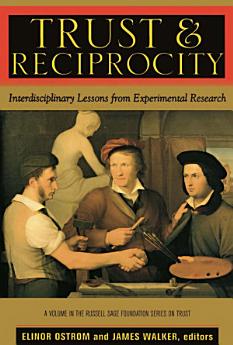Trust and Reciprocity: Interdisciplinary Lessons for Experimental Research
Elinor Ostrom · James Walker
feb 2003 · Russell Sage Foundation
E-boek
424
Pagina's
reportBeoordelingen en reviews worden niet geverifieerd. Meer informatie
Over dit e-boek
Trust is essential to economic and social transactions of all kinds, from choosing a marriage partner, to taking a job, and even buying a used car. The benefits to be gained from such transactions originate in the willingness of individuals to take risks by placing trust in others to behave in cooperative and non-exploitative ways. But how do humans decide whether or not to trust someone? Using findings from evolutionary psychology, game theory, and laboratory experiments, Trust and Reciprocity examines the importance of reciprocal relationships in explaining the origins of trust and trustworthy behavior. In Part I, contributor Russell Hardin argues that before one can understand trust one must account for the conditions that make someone trustworthy. Elinor Ostrom discusses evidence that individuals achieve outcomes better than those predicted by models of game theory based on purely selfish motivations. In Part II, the book takes on the biological foundations of trust. Frans de Waal illustrates the deep evolutionary roots of trust and reciprocity with examples from the animal world, such as the way chimpanzees exchange social services like grooming and sharing. Other contributors look at the links between evolution, cognition, and behavior. Kevin McCabe examines how the human mind processes the complex commitments that reciprocal relationships require, summarizing brain imaging experiments that suggest the frontal lobe region is activated when humans try to cooperate with their fellow humans. Acknowledging the importance of game theory as a theoretical model for examining strategic relationships, in Part III the contributors tackle the question of how simple game theoretic models must be extended to explain behavior in situations involving trust and reciprocity. Reviewing a range of experimental studies, Karen Cook and Robin Cooper conclude that trust is dependent on the complex relationships between incentives and individual characteristics, and must be examined in light of the social contexts which promote or erode trust. As an example, Catherine Eckel and Rick Wilson explore how people's cues, such as facial expressions and body language, affect whether others will trust them. The divergent views in this volume are unified by the basic conviction that humans gain through the development of trusting relationships. Trust and Reciprocity advances our understanding of what makes people willing or unwilling to take the risks involved in building such relationships and why. A Volume in the Russell Sage Foundation Series on Trust
Over de auteur
ELINOR OSTROM is Arthur F. Bentley Professor of Political Science and codirector of the Workshop in Political Theory and Policy Analysis and the Center for the Study of Institutions, Population, and Environmental Change, Indiana University, Bloomington. JAMES WALKER is Professor of Economics and co-associate director of the Workshop in Political Theory and Policy Analysis, Indiana University, Bloomington.
Dit e-boek beoordelen
Geef ons je mening.
Informatie over lezen
Smartphones en tablets
Installeer de Google Play Boeken-app voor Android en iPad/iPhone. De app wordt automatisch gesynchroniseerd met je account en met de app kun je online of offline lezen, waar je ook bent.
Laptops en computers
Via de webbrowser van je computer kun je luisteren naar audioboeken die je hebt gekocht op Google Play.
eReaders en andere apparaten
Als je wilt lezen op e-ink-apparaten zoals e-readers van Kobo, moet je een bestand downloaden en overzetten naar je apparaat. Volg de gedetailleerde instructies in het Helpcentrum om de bestanden over te zetten op ondersteunde e-readers.






